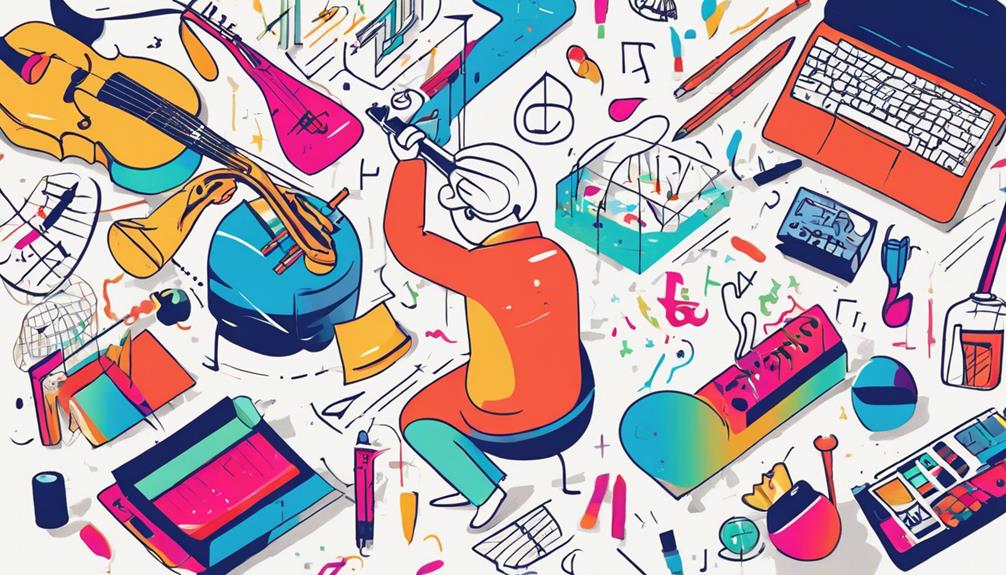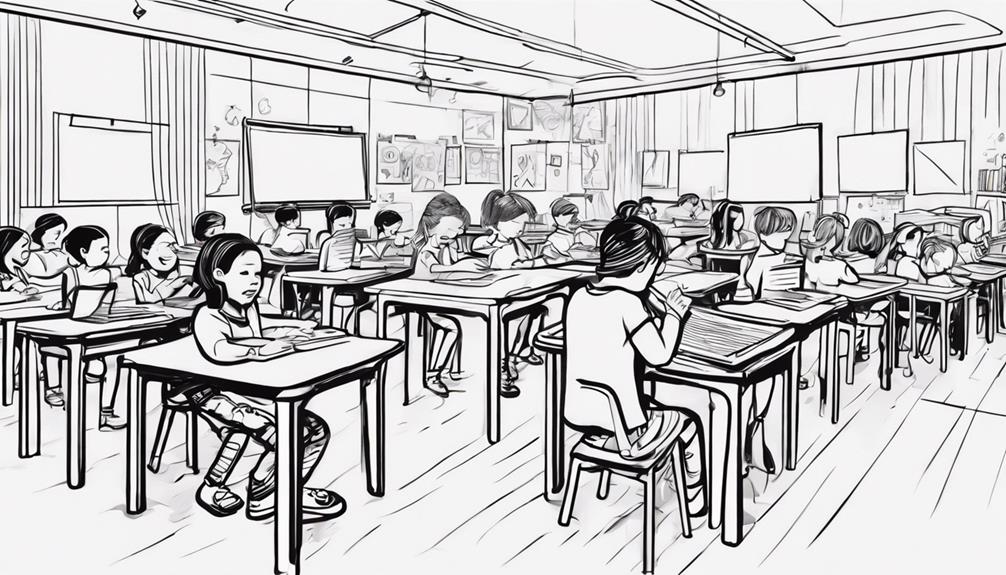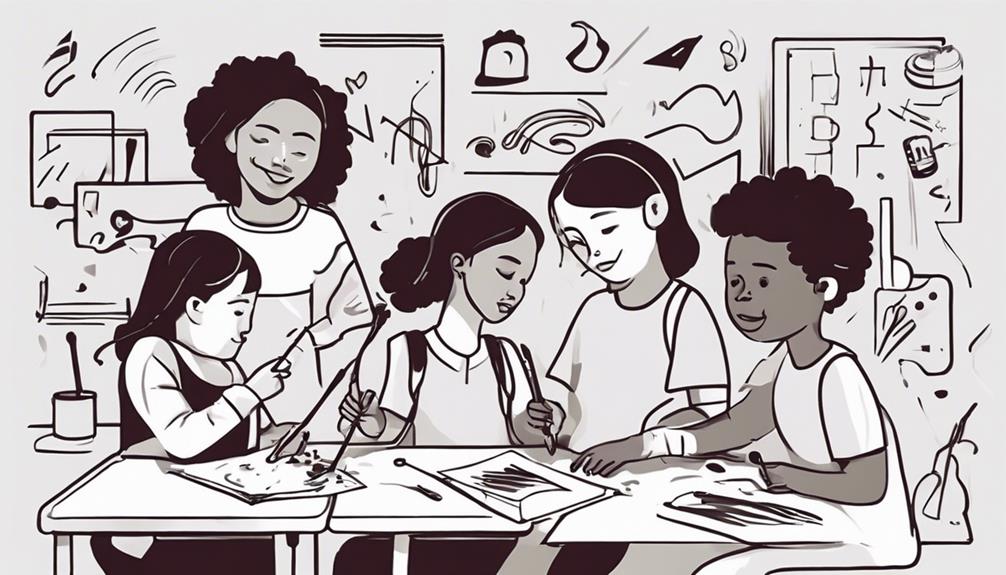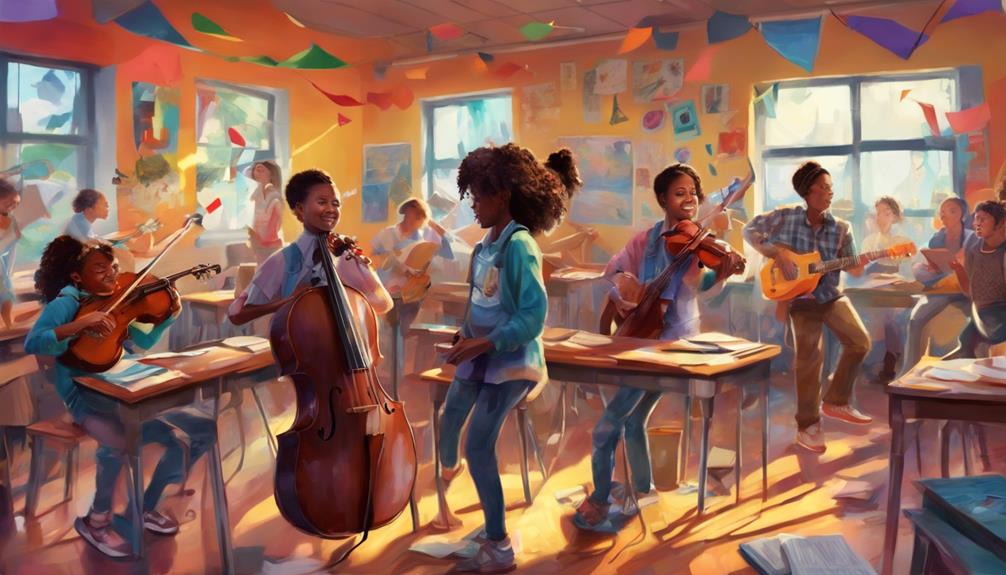Art and music are integral components of a well-rounded education, offering a myriad of benefits that extend beyond mere aesthetics. From fostering creativity to enhancing cognitive abilities, the impact of arts on academic performance and holistic development is profound. By exploring the intersections of art, music, and education, one can uncover a wealth of research-backed insights into their transformative power. This discussion will delve into the intricate relationship between art, music, and education, shedding light on the crucial role they play in shaping young minds and nurturing essential skills for success in a rapidly evolving world.
Key Takeaways
- Art and music education enhance academic performance and success in various subjects.
- Creativity and innovation thrive through art and music, fostering problem-solving skills.
- Visual arts and music develop cognitive skills, critical thinking, and cultural understanding.
- Art and music education cultivate social and emotional intelligence, building empathy and strong interpersonal connections.
Enhancing Academic Performance Through Arts

The incorporation of art and music education has shown a significant correlation with enhanced academic performance among students across various subjects and disciplines. Students involved in arts often exhibit higher academic recognition, excelling in math and science fairs. Additionally, they are more likely to win awards and school office positions, showcasing their academic excellence. Academic achievement is closely linked to student involvement in arts, leading to improved performance in a wide range of subjects. The inclusion of art and music courses in the curriculum not only provides students with creative outlets but also increases their motivation, contributing to higher academic success.
Moreover, arts education is associated with gains in math, reading, cognitive ability, critical thinking, and verbal skills, all of which play a crucial role in enhancing academic performance. By engaging in arts involvement, students develop essential skills that are transferable to their academic endeavors, ultimately improving their overall academic achievement.
Fostering Creativity and Innovation
Exploring the significance of fostering creativity and innovation through art and music in education unveils a realm where imagination and originality thrive. By stimulating students' creativity, these subjects play a vital role in cultivating problem-solving skills from a young age. Initiatives that encourage artistic expression can shape individuals who are not only innovative but also equipped to navigate the challenges of an increasingly complex world.
Stimulating Imagination and Originality
Stimulating imagination and fostering originality through art and music education plays a crucial role in nurturing creativity and innovation in children. By incorporating creative courses into the curriculum, students are motivated to explore unconventional ideas and develop innovative thinking skills. Engagement in the arts not only boosts academic recognition but also enhances students' ability to excel in various fields, including math and science. Arts education instills a sense of creativity that sets individuals apart, making them more competitive in job and college applications. The emphasis on imagination and originality in the educational setting highlights the significance of creativity in shaping future innovators and problem-solvers. Through arts education, children are equipped with the necessary skills to thrive in a constantly evolving world demanding innovation.
Cultivating Problem-Solving Skills
Engagement in art and music education enhances students' problem-solving skills by fostering creativity and innovation through self-expression and exploration. Students exposed to artistic processes develop innovative thinking patterns as they tackle challenges inherent in creating and interpreting art and music. These creative outlets stimulate critical thinking, enabling individuals to approach problems with a fresh perspective. By actively creating art and music, students are pushed to develop skills in problem-solving, often leading to the generation of unique solutions. The process of self-expression and exploration in artistic endeavors not only aids in honing problem-solving abilities but also encourages individuals to think creatively and adaptively when faced with obstacles, contributing to a well-rounded skill set essential for success in various facets of life.
Developing Visual and Auditory Skills

Engaging in visual arts such as drawing and painting can significantly enhance sensory perception by developing visual-spatial skills. Similarly, playing musical instruments aids in stimulating auditory skills, improving sound discrimination and tone recognition. These activities not only foster creativity and imagination but also play a crucial role in honing essential visual and auditory processing abilities.
Enhancing Sensory Perception
Art and music education play a crucial role in the development of children's visual and auditory skills, enhancing their sensory perception abilities. Through exposure to diverse art forms and musical genres, students benefit from improved sensory perception and appreciation. Visual arts activities such as drawing and painting contribute to the enhancement of visual-spatial skills, enabling children to better understand and interpret visual information. Simultaneously, music education accelerates the development of auditory skills, refining abilities in listening and sound recognition. By engaging in these activities, students not only enhance their sensory perception but also promote overall cognitive development, fostering a well-rounded educational experience.
Stimulating Creativity and Imagination
Stimulation of creativity and imagination through exposure to art and music is instrumental in developing children's visual and auditory skills, fostering holistic cognitive growth. Encouraging self-expression and risk-taking, art and music activities ignite creativity and imaginative thinking. Visual arts such as drawing and painting play a significant role in enhancing visual-spatial skills, while music aids in refining auditory skills and accelerating language development. Moreover, art and music expose children to diverse cultures, expanding their cultural awareness and understanding. By engaging in creative processes, students cultivate critical thinking abilities and foster innovation. Therefore, integrating art and music into education not only nurtures creativity and imagination but also contributes to the overall cognitive development of children.
Cultivating Social and Emotional Intelligence
The integration of art and music into educational curricula plays a crucial role in nurturing students' social and emotional intelligence. Arts education goes beyond the acquisition of technical skills; it serves as a powerful tool for developing essential qualities that are fundamental for personal and social growth. Here are key ways in which artistic activities contribute to cultivating social and emotional intelligence:
- Fostering Empathy: Through engaging with art and music, students learn to understand and share the feelings of others, enhancing their capacity for empathy.
- Promoting Cultural Awareness: Artistic activities expose students to diverse cultural expressions, fostering an appreciation for different backgrounds and traditions.
- Building Strong Interpersonal Connections: Participation in art and music programs provides opportunities for students to connect with peers, teachers, and the community, contributing to the development of meaningful relationships.
In essence, art and music education serve as vehicles for enhancing students' social skills, emotional intelligence, empathy, cultural awareness, and interpersonal connections.
Enhancing Cognitive Abilities With Arts

The cognitive benefits of arts education are increasingly recognized in academic research and educational practice, highlighting the valuable role that engagement with artistic activities plays in enhancing various cognitive abilities. Music training, for instance, has been associated with improved memory, attention, and problem-solving skills. Similarly, engaging in visual arts such as drawing and painting can aid in developing critical thinking skills and enhancing visual-spatial abilities in children. Exposure to diverse cultures through art and music has shown to boost cognitive flexibility and cultural awareness. Moreover, learning to play musical instruments can improve logical reasoning skills, decision-making abilities, and overall cognitive development. Studies have demonstrated that integrating arts education into school curricula can enhance students' cognitive abilities, fostering creativity, problem-solving skills, and innovative thinking. By nurturing critical thinking, visual-spatial skills, cognitive flexibility, logical reasoning, problem-solving capabilities, cultural awareness, and innovative thinking, arts education contributes significantly to cognitive development and the enhancement of various cognitive abilities.
Instilling Discipline and Focus Through Music
Regular practice and focused skill improvement are essential aspects of instilling discipline and concentration through music education. Engaging in music education instills a sense of responsibility in students to meet practice and performance expectations. Here are three key aspects highlighting the significance of instilling discipline and focus through music:
- Commitment and Dedication: Learning music requires a high level of commitment to regular practice sessions and continuous skill enhancement. This dedication promotes discipline and helps individuals stay focused on their musical goals.
- Attention to Detail and Precision: Playing musical instruments demands attention to detail and precision in executing musical pieces. This focus on intricate nuances fosters discipline and teaches individuals the importance of precision in their performance.
- Developing Responsibility: Music education teaches students the responsibility of consistently honing their craft. Meeting practice schedules and performance requirements instills a sense of duty and accountability, promoting discipline and focus in their musical endeavors.
Frequently Asked Questions
Why Is Learning Art and Music Important?
Learning art and music is crucial for fostering creativity, expression, critical thinking, problem-solving, emotional development, cultural appreciation, social skills, fine motor skills, confidence building, and memory enhancement. These disciplines provide a holistic approach to education by nurturing various aspects of a child's development, leading to well-rounded individuals capable of navigating the complexities of the modern world.
How Is Art Important in Education?
Art is vital in education for fostering creativity, critical thinking, and self-expression. It plays a significant role in enhancing cultural awareness, emotional intelligence, and problem-solving skills. By engaging in artistic activities, students develop communication skills, build confidence, and have opportunities for collaboration. Art education provides a platform for holistic development, encouraging students to explore their creativity, think analytically, and express themselves authentically through various forms of artistic expression.
How Does Art and Music Improve Academic Performance?
Art and music improve academic performance by enhancing cognitive development, creativity, and problem-solving skills. They boost memory retention, attention span, and critical thinking. Emotional expression through art and music fosters self-confidence and communication skills. Exposure to diverse cultures promotes cultural appreciation and social skills. Additionally, engagement in arts leads to brain development, stress relief, motivation, discipline, teamwork, and collaboration, all contributing to better academic outcomes.
Why Do People Say That Art and Music Are Essential for Student Success?
Art and music are deemed essential for student success due to their profound impact on creativity, emotional expression, and cognitive development. Like a guiding light, they inspire critical thinking, nurture cultural understanding, and enhance communication skills. Through artistic endeavors, students build self-confidence, forge social connections, and engage more deeply in academics. These disciplines serve as a gateway to a holistic education, fostering a well-rounded individual primed for success in various facets of life.
Conclusion
In conclusion, art and music are integral components of education that enhance academic performance, foster creativity, develop visual and auditory skills, cultivate social and emotional intelligence, enhance cognitive abilities, and instill discipline and focus. As the saying goes, "Creativity is intelligence having fun," emphasizing the importance of incorporating art and music in educational curricula to nurture well-rounded individuals capable of critical thinking and innovation.
